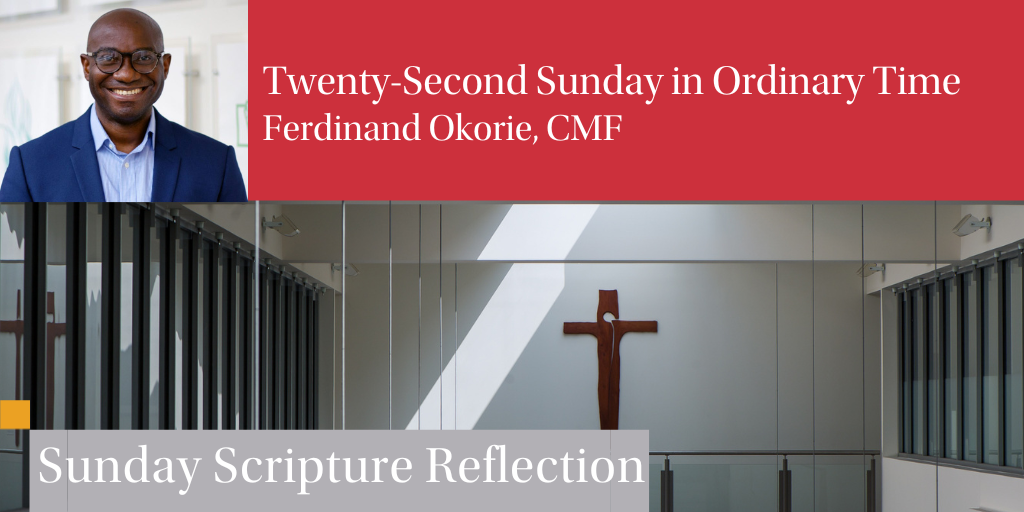
Readings:
Reading I: Sirach 3:17-18, 20, 28-29
Psalm: 68:4-5, 6-7, 10-11
Reading II: Hebrews 12:18-19, 22-24a
Gospel: Luke 14:1, 7-14
Ours is a society that preaches success, encourages and insists that with the best effort and determination each and every one of us can certainly achieve our goals and dreams, succeeding in becoming whatever we choose to be in the society and in the world. We hear this mantra at our kids’ little league sport competitions, and at every high school and college graduation ceremonies. Anyone who has put in the hard work, as the saying goes, burning the proverbial midnight oil, and has eventually gained fame and success may probably desire nothing greater than the credit of standing out among peers with all the trappings of power and recognition that should accompany success of any kind.
Indeed, ours is a society that encourages you to be the one with the groundbreaking idea that impacts human life, or the one with the innovative technological breakthrough that will make the most impact to human existence. Even philanthropic and altruistic activities risk decorating us with a larger-than-life persona, which could potentially diminish the recipients of our kindhearted, generous and self-giving activities.
It is in this social context that Ben Sirach invites us to go about our duties and responsibilities to ourselves and others with humility. Insisting that we should eschew the virtuous life of humility by which we elevate the humanity of us over me. When we do so, then we begin to bring down the cold-spirited feeling of an ingroup mentality, which manifests in the inhumane behaviors toward others that is supported by the sentiments of ethnicity, tribalism, exclusivity, denomination, parochial, etc., and replace them with the attitude of unity in diversity, ecumenism of traditions, the unitive spirit of the human family, interdenominational respect of beliefs, the interconnectedness of humankind, and so on and so forth. In other words, Ben Sirach reminds us that we are able to recognize, embrace, and share in the humanity of each other through the virtuous life of humility.
Ben Sirach further counseled in the First Reading that humility is not about the feeling of self-abasement, negation or deprecation, rather, the virtue of humility elevates us to the famed pedestal of honor as we find favor with God (Sirach 3:18). Isn’t finding favor in the sight of God the greatest spiritual goal of the Christian life? Our life of disciples of Christ is one of kenosis just as Christ’s life. By so doing, we too will experience the favor of God through divine glorification. Let us see through the invitation of Ben Sirach the example of Christ in the Philippian Hymn (Phil 2:5-11) so that as disciples, we can strive towards having the same mind that was in Christ Jesus our Lord in order to experience the favor of God.
Christ’s humility manifests in service, serving humanity through the pain of crucifixion and death (Phil 2:8). The kenosis of Jesus Christ is for the singular purpose of identifying with the human condition because kenosis is the ability to see ourselves through the conditions or circumstances of the life experiences of others so as to do everything in our power to elevate them to the human condition intended for each one of us by God. This is the humility of Christ that we are encouraged to practice as disciples. Just as God gratuitously favored Christ for his humbling service on behalf of humanity (Phil 2:9-11), likewise God will favor us as Ben Sirach revealed.
With this in mind, then, how does our state of life invite us to practice humility? For the wealthy host of the banquet in the Gospel Reading, Christ invites him to share his resource, becoming a benefactor to the poor in the community who are unable to reciprocate his kindness with material benefit (Luke 14:13-14). To the guest in the Gospel Reading, Christ urges him to embrace a life of simplicity in the public space without readily seeking honorable recognition for all the many good things that perhaps one has done (14:8-10). For us today, it is, among others, an invitation to engage in public discourse to elevate and strengthen each other’s perspective and outlook in life, removing bias and prejudice. Also, the invitation to humility demands that we remove the blinders that have denied us the ability to see through each other the essence of our common humanity. Furthermore, the ultimate invitation to humility, in the words of Pope Francis in Fratelli Tutti, manifests in the good deeds directed toward others “apart from their physical or moral appearances. Our love for others, for who they are, moves us to seek the best for their lives.” By so doing, therefore, our life of humility becomes an experience in building a social system that excludes no one, but rather elevates all.
